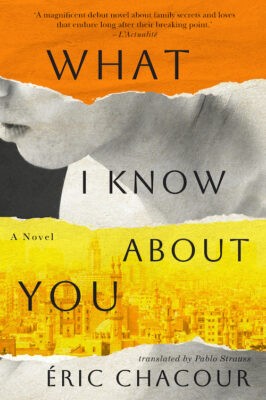Widely lauded in French and widely anticipated in English, Éric Chacour’s debut novel is a familiar tale of forbidden love bolstered by the fresh insight of a first-time author. Originally published by Éditions Alto and now translated by Pablo Strauss for Coach House Books, What I Know About You tells the story of Tarek and Ali’s love affair against the backdrop of post-Nasser Egypt, with intermittent forays to Montreal at the turn of the new millennium.

What I Know About You
Éric Chacour
Translated by Pablo Strauss
Coach House Books
$23.95
paper
224pp
9781552454855
Juxtaposed with the intimacy of the scene at hand, the appearance of an implicit narrator watching alongside us is startling: not the effect of a horror movie jump scare, but more of a magician revealing his cards. Though the story is divided by section headings – “You,” “Me,” and “Us” – Chacour employs not so much a shift of perspective as a narratorial sleight of hand. What this reveals is a writer sharply aware of form, both its limitations and affordances. While some of the scenes, particularly those set in Montreal, unroll with a cinematic quality, the story is dependent on the unseen in a way that is especially suited to the written word. We don’t know who is behind the titular “I” of the narration, only that their presence gradually becomes palpable to the point where the “I” threatens to usurp the “you” as protagonist of the story. It is a masterful use of narrative perspective, one that reveals at the same moment it obscures.
Tricks of the light also bolster Chacour’s treatment of time and place, oscillating between the sun-bleached sands of Cairo and the darkness of Montreal winter. In Cairo, the past tense comes alive in visceral details – we smell the baking leather seats inside a parked call, and feel the dust sticking on damp skin. In Montreal, the present is grey, laconic, unending. Chacour’s characters come to the fore across this backdrop as if figures in a chiaroscuro, emerging from the shadows even when it’s unclear who is holding the light.
Inspired by the mot juste of classical French literature and the rhythm of English prose, Chacour’s writing shows a clear poetic sensibility and an admirable formal restraint. Local readers may find in his unconventional style affinities with Montreal writer Anaïs Barbeau-Lavalette (also published in English by Coach House). Chacour’s writing, like Barbeau-Lavalette’s, seems similarly well-poised for the stage. Whatever comes next, this promising debut sets Chacour swiftly at the forefront of the city’s rising literary voices.mRb






0 Comments